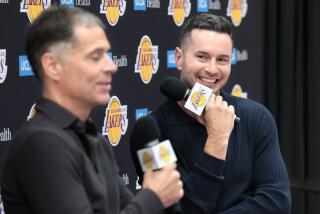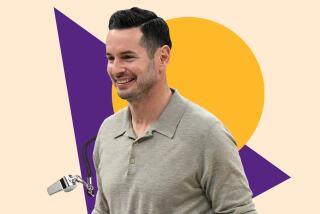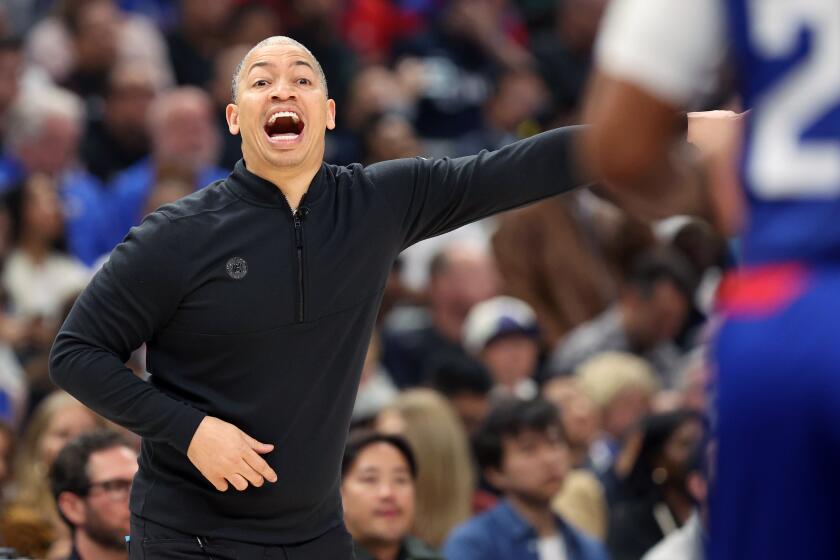LUCKY CHARM
- Share via
BOSTON — It was always the same. He passed his hands over the waters and, lo, they parted.
At Boston University, where they had nothing to lose by hiring a 26-year-old coach; at humble Providence; in New York, where spiders spun cobwebs in Madison Square Garden before he arrived, and at post-NCAA-scandal Kentucky, Rick Pitino raised his arm and the waters receded, allowing the Terriers, Friars, Knicks and Wildcats to scurry across to the other side.
As it was in the past, so it is again, miracles without end, amen. The Boston Celtics are suddenly respectable, an astounding turnaround, even if it had been predicted (by Pitino, anyway), prayed for and paid for.
Last season’s administratively challenged 15-67 laughingstock has turned into a 7-6 NBA team. This would be unbelievable if Pitino hadn’t done it so often.
His peers are paying him the ultimate compliment. They aren’t surprised.
“As far as his system goes, I think Rick’s smarter than all of us,” Orlando’s Chuck Daly says.
Who would have thought they could win five of six with a lineup featuring three players--Chauncey Billups, Ron Mercer and Walter McCarty--who had never started a pro game, and a fourth, Travis Knight, who had started 17?
Perhaps Pitino would have, though judging by his frantic moves, he might have had his doubts. Perhaps owner Paul Gaston, who gave him total control and a $50-million, seven-year deal, though judging by Gaston’s record, if he knew what he was doing, it was a new experience.
Of course, there’s great pressure on miracle workers, which may explain last summer’s moves: a $22-million contract for Knight, who hadn’t averaged double figures since high school; $33 million for Chris Mills, $8 million for Andrew DeClerq, $2.7 million for Tony Massenburg.
It looked pricey for flotsam and jetsam and worse when, after a 0-4 exhibition start, Pitino traded Mills and Massenburg and shopped his top draft pick, Billups.
It seems OK now, even if everyone is dizzy, trying to figure out what Pitino is up to.
He promises a run at the playoffs this season, at a title in five. He has already hamstrung himself for three, having spent most of his salary cap, but at this tender and happy moment in the new era, who wants to tell Pitino what he can’t do?
“Who am I to say?” Indiana Pacer President Donnie Walsh said. “Maybe he’s going to do something with that system that we’ve never seen before. If it was normal NBA, I’d say, ‘Yeah, it’s crazy.’
“But I’m not betting against him because he’s such a great coach.”
BOY GENIUS
It’s a non-decision-making system, except for which press to call. [Pitino] gets his scoring out of his defense while the rest of us are struggling to make a call every time down.
I wish I’d learned that system a long time ago. I wouldn’t look so old now.
--Chuck Daly
Unforgettable, that’s what he was.
In his first job, as a University of Hawaii graduate assistant, Pitino was personally cited by the NCAA for eight rules violations. During the investigation, he went to see the school president, pleaded his innocence . . . and applied for the job held by his boss, Coach Bruce O’Neil.
But Pitino was more than just another set of bared fangs, which are common among young assistants.
He was a hit at BU, took Providence to the Final Four and the Knicks from 28 wins to 52 in two seasons. His first Kentucky team, made up of former reserves after the bad times when cash fell out of delivery envelopes and the NCAA moved a mobile investigative unit onto campus, did such an incredible job to go 14-14 that the school retired three players’ numbers.
Pitino had something, an all-out pressing system that was a crowd-pleaser on campus and a breath of fresh air in the moribund NBA.
When he came along, full-court pressure was no longer in vogue. The pros sneered at it, and after John Wooden and John Thompson, college teams got so much practice, they were good at beating it.
But Pitino had new wrinkles. He ran a fast-paced, three-point shooting, ball-shouldn’t-hit-floor offense that meshed with his defense. When his players trapped, they raised their hands to show officials they weren’t fouling and worked their prey over with their lower bodies. Turnovers often followed.
It was a frenetic system for a frenetic young man, already becoming a legend among coaches, to whom zeal is not an attribute but a way of life.
Once, when lightning hit the Knicks’ satellite dish, leaving no game tapes to view, he ordered assistant Ralph Willard to move near their facility in bucolic Purchase, N.Y. Instead, Willard got an air mattress and slept in the TV room, arising periodically to check on the VCRs. After two weeks, Willard had circles under his eyes and Pitino let him move back home.
Then there was the time assistant Stu Jackson returned from a two-week scouting trip, only to be told to go see the 76ers, the Knicks’ playoff opponent.
Jackson pleaded for one night home with his wife, finally breaking into tears. Pitino, according to Sports Illustrated’s Bill Nack, told him to “knock off the . . . crying!”
Nevertheless, Jackson, now Vancouver’s general manager, and Willard, coaching Pitt, remain close to Pitino. Boston U., Providence, Knick and Kentucky players responded similarly to his system, which was tough and loud, but caring.
Meanwhile, the pros looked Pitino over and salivated.
He was successful, charismatic and, unlike most college aces, had shown he could make it work in the NBA. Offers poured in. Friends insisted it was only a matter of time, but Pitino took lots of it.
Kentucky had made him wealthy. He loved horses and was in thoroughbred heaven. Although he was a New York native, he’d had a bad experience in his dream job, warring with Knick General Manager Al Bianchi, an NBA dinosaur who hated his college-style game.
Also, Pitino didn’t like the baggage he carried. He had bolted Providence days after signing a five-year contract, mused about returning to college soon after joining the Knicks and been labeled “Larry Brown on training wheels” by the New York Times’ Harvey Araton.
Five years into Pitino’s stay in Lexington, the Lakers reportedly offered a salary far above the profession’s highest, Pat Riley’s $1.5 million, but struck out. Nevertheless, Pitino still had his antennae up.
A year ago, having won his NCAA title--and watched sophomore star Antoine Walker bolt for the pros--he almost accepted an offer from the New Jersey Nets that included ownership.
A longtime associate says Pitino might have stayed, in part, to prove he wasn’t Larry Brown. But there was no doubt what No. 1 on the wish list was in this life in which wishes so often had come true: Boston, which had once been home, where the Celtics were not only storied but dreadful.
Why would a 45-year-old man, who had put himself through the hell of rebuilding four times--in his first Knick season, he says he lost 20 pounds, to 163--who was now rich and famous, do it again? He says he needs challenges, suggesting that friends who insisted he’d return to the NBA were right all along. Slicker though he may be, and more image conscious, Pitino does have something in common with Brown.
By last spring, when Gaston was arriving at the belated realization that M.L. Carr was untenable, Pitino was monitoring developments, giving Celtic writers his home and cellular phone numbers. Celtic fans prayed for his coming as if he were the young Red Auerbach.
Gaston waffled, as usual.
Consultant Larry Bird was allowed to approach Pitino, but Bird, himself, was on his way out--he had an intriguing offer from the Pacers--and told Pitino.
Pitino withdrew, blasting the organization.
“There are too many people who have an agenda there,” he said.
On a book tour to Boston, he told friends it was hopeless and went on and on about the players he would recruit for Kentucky.
Carr, an underrated corporate infighter, thinking he had beaten back another challenge, sneered, “Usually the way it works is, management picks the coach. The coach doesn’t pick management.”
Then something funny happened, or several things.
Bird left for Indiana.
The stunned Celtics, convinced that they needed a big name fast, turned to Brown, who was supposed to fly from his summer home in Los Angeles to Boston for a final meeting with Gaston.
Brown ran into Pitino, vacationing on the West Coast, on a golf course a couple of days before the meeting and told him about it.
Brown never got his meeting. Pitino reapplied and the rest was Celtic history.
Pitino said later that he had gotten a surprising recommendation from former Celtic vice president Dave Gavitt, working behind the scenes at Gaston’s request. Maybe Pitino also felt a twinge at the thought of Brown’s getting Pitino’s latest dream job.
For sure, things changed fast. Auerbach, suspected of propping Carr up for so long, was now out of the loop. The Boston Globe’s Peter May, learning that Pitino was to get Auerbach’s team presidency, called Red.
“That’s absolutely not true,” Auerbach said.
Yes, it was. The next day there was a news conference on the FleetCenter parquet that looked more like a coronation, with championship banners lowered as a backdrop. Pitino was as engaging as ever, telling a story of his son, Chris, a student at nearby Milton Academy, singing his dad a line from an old pop song, “Please Come to Boston.”
Of course, when Chris was asked about it, he said he didn’t know that song.
BRAVE NEW WORLD
I wish I was getting 4 1/2 hours of sleep. I haven’t slept since the Milwaukee [exhibition]. I’m just thinking, if that happens again, when the flight attendant says, “Can I get you anything?” I’ll say, “Yes, open the door at 30,000 feet.”
--Pitino, five weeks ago
It was a new day, all right.
For the first time in memory, Auerbach didn’t attend media day. Nor did Carr, retired to a vice presidency. Instead, there was feverish activity, the assistant coaches Pitino had brought from Kentucky running around, tapping on laptop computers, pulling cell phones out of holsters.
Pitino found an old gym on a Navy base in Newport, R.I., because “We don’t want it to be too nice for them.” He worked his players until several needed IVs. When they didn’t get it during the exhibition season, he ran two-a-days in the regular season. Not even Riley had done that.
There were only five holdovers: Walker, their projected star, plus Dee Brown, Greg Minor, Dana Barros and Pervis Ellison, who had long-term contracts no one would take.
Pitino was going for broke. On draft day, he agreed to swap his Nos. 3 and 6 picks for 32-year-old Scottie Pippen, but Chicago backed out. He tried to trade for Utah’s Keith Van Horn, but his old protege and now rival, Net Coach John Calipari, beat him to it.
“When we made that trade, I imagine Rick probably punched a couple of his staff members and he probably threw another one to the floor,” Calipari told Boston writers later. “Then I’d say he knocked over a blackboard and walked out of the room. I would say the chances of that being what he did are probably 92%.”
Pitino said he merely “walked away and said, ‘That little SOB.’ ”
People thought Pitino would get everyone to play hard, win 25 games and save cap room for next summer’s free agents--Pippen, Stephon Marbury, et al--or the one after, which will have Grant Hill and Penny Hardaway. Instead, he embarked on his whirlwind shopping spree, getting Knight, Mills, Massenburg, DeClerq, Tyus Edney. Suddenly, they were up to the cap and they still didn’t have one established great player.
“After speaking with the owner, I didn’t feel this organization could afford to do what you just said,” Pitino says.
“I don’t think this organization could afford a $110-million contract. I think we’re going to have a big nut with Antoine Walker [whom they hope to re-sign next summer], so I don’t think we could afford both those type players.
“I think we have to do it through the draft and through free agents like Travis Knight . . . build through the draft and then try and steal players through evaluations.”
So those are Gaston’s parameters?
You can ask Brown, who has remarked on Pitino’s “choir eyes.” Pitino may look boyish and sound sincere, but this isn’t a sandbox and he isn’t an innocent or a pawn. Maybe, this was as much Pitino’s plan as Gaston’s.
“Intellectually, Rick knows that [the Celtics can’t win right away],” a longtime associate says. “I don’t think emotionally or viscerally, he can handle it.
“I don’t think patience is one of his virtues. I think losing eats him up more now. He has too much to lose. He’s like Pat Riley, they’re not so much coaches as celebrities. Rick’s whole mystique is based on quick turnarounds.”
With their new arena, devoted fans, fat local radio-TV package and history, the Celtics aren’t some poor, small-market team. If they’re passing on Hill and Hardaway to go up against the elite teams with Walker, Knight, et al, well, it’ll be another great challenge for Pitino.
Of course, after what he has done, who wants to tell him he can’t do it? This season, anyway?
More to Read
Go beyond the scoreboard
Get the latest on L.A.'s teams in the daily Sports Report newsletter.
You may occasionally receive promotional content from the Los Angeles Times.










